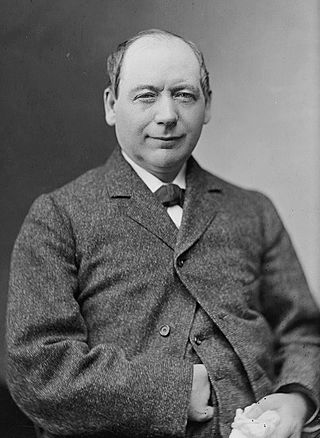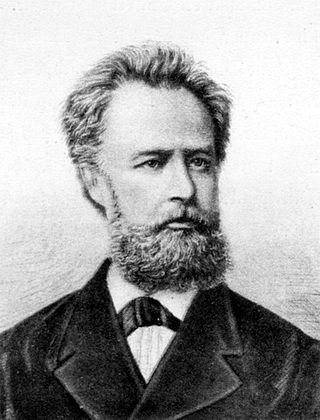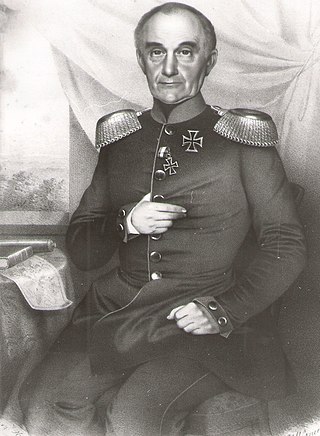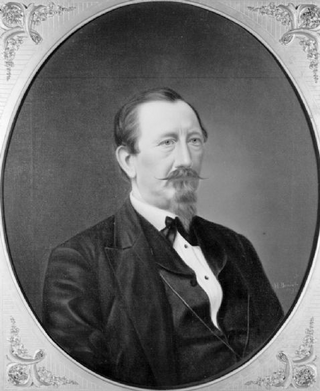
The Austrian Empire, officially known as the Empire of Austria, was a multinational European great power from 1804 to 1867, created by proclamation out of the realms of the Habsburgs. During its existence, it was the third most populous monarchy in Europe after the Russian Empire and the United Kingdom, while geographically, it was the third-largest empire in Europe after the Russian Empire and the First French Empire.

Wilhelm Martin Philipp Christian Ludwig Liebknecht was a German socialist and one of the principal founders of the Social Democratic Party of Germany (SPD). His political career was a pioneering project combining Marxist revolutionary theory with practical legal political activity. Under his leadership, the SPD grew from a tiny sect to become Germany's largest political party. He was the father of Karl Liebknecht and Theodor Liebknecht.

Ferdinand Freiligrath was a German poet, translator and liberal agitator, who is considered part of the Young Germany movement.

Hesse-Homburg was a state of the Holy Roman Empire and a sovereign member of the German Confederation, which consisted of the lordship of Homburg at the foot of the Taunus, which was then known as Die Höhe. The reigning princes belonged to the Darmstadt line of the House of Hesse. It was created in 1622 by the Landgrave of Hesse-Darmstadt to be ruled by one of his sons, but from 1622 to 1768 and again from 1806 to 1815, the territory was part of Hesse-Darmstadt. It was briefly divided into Hesse-Homburg and Hesse-Homburg-Bingenheim; but these parts were reunited in 1681. In 1815, it became a sovereign principality, expanded with the addition of Oberamt Meisenheim in the Rhineland to give a total area of 221 km². When the reigning princely family died out in March 1866, the territory returned to Hesse-Darmstadt, but the latter was forced to cede the territory to Prussia in September of the same year after it was defeated in the Austro-Prussian War.

The Forty-eighters (48ers) were Europeans who participated in or supported the Revolutions of 1848 that swept Europe. In the German Confederation, the Forty-eighters favoured unification of Germany, a more democratic government, and guarantees of human rights. Although many Americans felt very sympathetic to their cause and were deeply saddened by their defeat, many Forty-Eighters were Freethinkers who were more influenced by post-1789 republicanism in France and the anti-religious ideas of The Enlightenment than the U.S. Constitution. In particular, their traditional hostility towards tolerating religious practice or Classical Christian education, often put them at odds with American Republicanism's belief in freedom of religion and the independence of religious institutions from control by the State. Disappointed at their failure to permanently change the system of government in the German States or the Austrian Empire, and sometimes ordered by local governments to emigrate because of their involvement in the revolution, they gave up their old lives to live abroad. They emigrated to Australia, the United Kingdom, and the United States. They included Germans, Czechs, Hungarians, Italians, among many others. A large number were respected, politically active, wealthy, and well-educated, and found success in their new countries.

Gustav Struve, known as Gustav von Struve until he gave up his title, was a German surgeon, politician, lawyer and publicist, and a revolutionary during the German revolutions of 1848–1849 in Baden, Germany. He also spent over a decade in the United States and was active there as a reformer.

The Kingdom of Lombardy–Venetia, commonly called the "Lombardo-Venetian Kingdom", was a constituent land of the Austrian Empire from 1815 to 1866. It was created in 1815 by resolution of the Congress of Vienna in recognition of the Austrian House of Habsburg-Lorraine's rights to the former Duchy of Milan and the former Republic of Venice after the Napoleonic Kingdom of Italy, proclaimed in 1805, had collapsed.

Karel Havlíček Borovský was a Czech writer, poet, critic, politician, journalist, and publisher.
The von Hurter family belonged to the Swiss nobility; in the eighteenth and nineteenth centuries three of them were known for their conversions to Roman Catholicism, their ecclesiastical careers in Austria and their theological writings.

Gerhard Anton Eickhoff was a German-American journalist, editor, author, lawyer, Congressman from New York, United States Treasury auditor, and New York City Fire Commissioner.
Henry Nes was an American medical doctor and politician.

Friedrich Kapp was a German-American lawyer, writer, and politician. He was an outspoken opponent of Germany's colonization fervor during his time as a National Liberal Reichstag deputy. This was exemplified in his speech to the annual Congress of German Economists. Kapp stressed both the unprofitability of colonies and their negative impact on Anglo-German relations.
Adolf Heinrich Strodtmann was a German poet, journalist, translator and literary historian. He wrote an early biography of Heinrich Heine and emigrated to the United States for a time.

Karl Wilhelm Freiherr von Willisen was a Prussian general.

Carl Ferdinand Julius Fröbel was a German geologist and mineralogist, journalist, and democratic revolutionary already during the Vormärz era. He was active in Germany, Switzerland, the United States and South America at different times in his life.

Joseph Arnold Weydemeyer was a military officer in the Kingdom of Prussia and the United States as well as a journalist, politician and Marxist revolutionary.

Frederick William Horn was a German-American immigrant, lawyer, politician, and Wisconsin pioneer. He served in many elected offices; he was the 4th, 7th, & 25th speaker of the Wisconsin State Assembly, and served a total of 14 years in the Assembly. He also served five years in the Wisconsin State Senate—including the first three sessions after statehood—and was the first mayor of Cedarburg, Wisconsin, serving seven years in that role. He generally identified as a Democrat, but was elected several times as an Independent.
Karl Friedrich Schapper was a German socialist and labour leader. He was one of the pioneers of the labour movement in Germany and an early associate of Wilhelm Weitling and Karl Marx.
Johannes Kriege was a German jurist, lawyer, diplomat and politician.

George F. Lewis was a nineteenth-century American journalist and proprietor of several newspapers. He helped in the printing of the first time news of presidential election results were published. He was involved in determining there was copper ore in Michigan to be mined. He was also mayor of Saginaw, Michigan.














